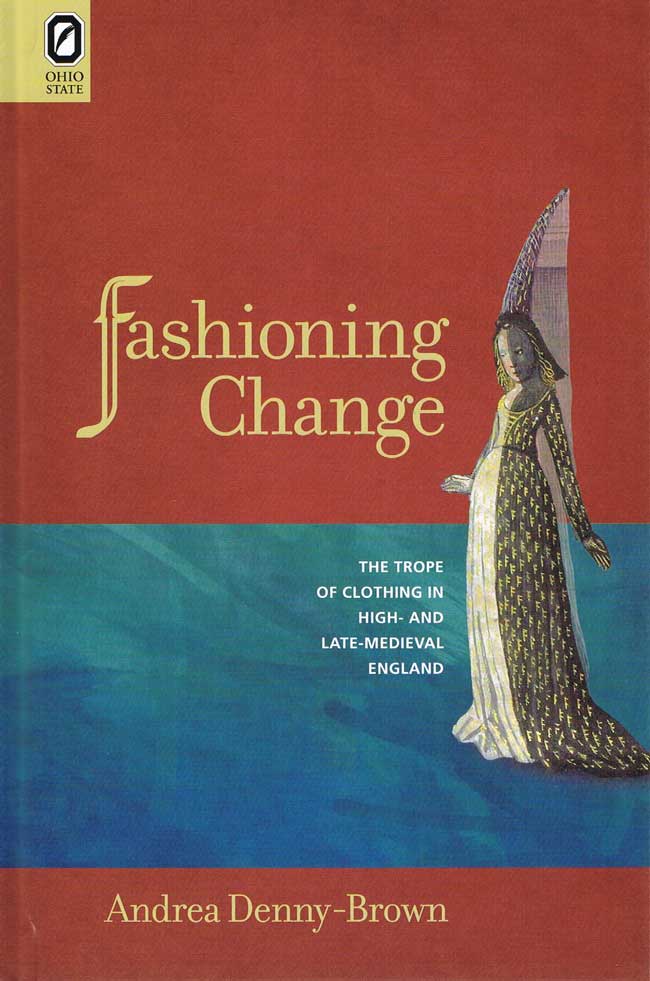Fashioning ChangeThe Trope of Clothing in High- and Late-Medieval EnglandAndrea Denny-BrownInterventions: New Studies in Medieval Culture |
 7/18/2012 Literary Criticism/Medieval, History/Medieval, Philosophy/History & Surveys/Medieval 252 pp. 6x9  $59.95 cloth 978-0-8142-1190-8 Add cloth to shopping cart Shopping Cart Instructions Review/Change Shopping Cart & Check-out | |||
|
“Fashioning Change discovers a late medieval world in which garments could express fortune’s instability, aesthetic turmoil, and spiritual crisis. Fashion was good to think. In lucid and compelling detail, Andrea Denny-Brown reveals just how and why the dress of ecclesiastics, dandies, wives, and kings figured mutability as an inescapable worldly condition.” —Susan Crane, professor of English and Comparative Literature, Columbia University, and author of The Performance of Self: Ritual, Clothing, and Identity during the Hundred Years War “Fashioning Change is one of the most original and inventive studies of medieval culture I have read. It is a book about the experience of social desire, the nature of civilized life, the relationships of craft and culture, and the aesthetics of performance. More than just a book about fashion, it is about fashioning: the self, society, and poetry. It is, therefore, a study of how medieval writers fashioned themselves and their worlds through an attentive encounter with the arts of bodily adornment. Engagingly written and scrupulously researched, Fashioning Change will be a signal contribution to the field of medieval studies.” —Seth Lerer, Dean of Arts and Humanities and Distinguished Professor of Literature at the University of California at San Diego “It is rare to find a book that casts its nets widely while meticulously analyzing the texts it discusses. This book does both. Denny-Brown provides insight into philosophical texts, cultural symbolics in textual and visual art, religious and theological texts and practices, Middle English poetry, and national identity, which taken together makes the book an invaluable index to medieval—not just Middle English—notions about fashion, philosophical approaches to change, gender dynamics, and aesthetics.” —Maura Nolan, University of California, Berkeley “Denny-Brown draws on texts of many genres as well as historical information to show that fashion—and the promise of fortune that accompanied it—had great appeal for men and women in the Middle Ages. The fashionable consumption of the clergy, of ‘foppish’ men whose style and habits associated them with gambling, and headstrong bourgeois wives with money (‘archwyves’), all provoked concern, censure, and satire. This is a fascinating study packed with information.” —Sarah-Grace Heller, The Ohio State University Medieval European culture was obsessed with clothing. In Fashioning Change: The Trope of Clothing in High- and Late-Medieval England, Andrea Denny-Brown explores the central impact of clothing in medieval ideas about impermanence and the ethical stakes of human transience. Studies of dress frequently contend with a prevailing cultural belief that bodily adornment speaks to interests that are frivolous, superficial, and cursory. Taking up the vexed topic of clothing’s inherent changeability, Denny-Brown uncovers an important new genealogy of clothing as a representational device, one imbued with a surprising philosophical pedigree and a long history of analytical weightiness. Considering writers as diverse as Boethius, Alain de Lille, William Durand, Chaucer, and Lydgate, among others, Denny-Brown tracks the development of a literary and cultural trope that begins in the sixth century and finds its highest expression in the vernacular poetry of fifteenth-century England. Among the topics covered are Boethian discourses on the care of the self, the changing garments of Lady Fortune, novelty in ecclesiastical fashions, the sartorial legacy of Chaucer’s Griselda, and the emergence of the English gallant. These literary treatments of vestimentary variation—which develop an aesthetics of change itself—enhance our understanding of clothing as a phenomenological and philosophical category in medieval Europe and illustrate the centrality of the Middle Ages to theories of aesthetics, of materiality, and of cultural change. Andrea Denny-Brown is assistant professor of English at University of California, Riverside. | ||||

